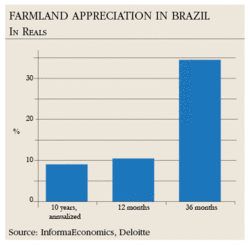Brazilian agro-investments set to rise
2013-01-23 14:15:36
Long-term trends in demand and supply for the world’s food resources are leading to growing interest in Brazilian agriculture as an asset class. A recent report by UK-based Chatham House suggests that demand for food will increase by between 70% and 100% by 2050, and states that the world will likely teeter close to food crises in the coming years. The UN’s Food and Agriculture Organization agrees with the low end of the range in the Chatham House report, estimating that food production must increase by 70% over the next 40 years.
Brazil is at the forefront of the development of new agricultural land to match this expected demand. An area of land that spans the Brazilian states of Maranhão (MA), Tocantins (TO), Piauí (PI) and Bahia (BA) – dubbed Matopiba – produced 12.2 million tonnes of Brazil’s total grains and oilseed crops in 2011/12, equivalent to 8.2% of the country’s total production, according to a report by Rabobank. The region’s output has grown from essentially zero a decade earlier, when the land was considered unfit for large-scale agricultural production. However, the Brazilian Agricultural Research Corporation discovered that the prevailing cerrado biome could be made fertile with large additions to the soil of lime and phosphorus. With further investment in machinery and infrastructure, large farms have been created in this area.
Rabobank estimates that the Matopiba has 2 million hectares of high-quality land available for future production. There is also land outside this designated area with big potential and the area’s weather – warm, sunny and with plenty of rainfall – make it possible that if crop prices continue to increase, the investment in these new tracts of land will make commercial sense.
MetLife, the largest US life insurer, has already started this year to offer agricultural loans in Brazil, seeing the appreciation of land as good, growing and safe collateral. According to Brazil’s agriculture ministry, agricultural loans in the 2011-12 season total R$107 billion ($51.2 billion) and the potential for growth is attracting local and foreign financial institutions to these Brazilian regions.
International investment funds are now raising money to take advantage of this new asset class, which offers good portfolio diversification as well as being an inflation hedge. Valiance, a London-based asset manager, launched a fund in May 2012 that aims to invest in Brazilian farmland, with investors exposed to the upside in the value of land as it goes through the process of acquiring cerrado land, obtaining permits and then developing the land into what is expected to be high-performing farmland. The investment is channelled into a joint venture with Bovespa-listed farming company SLC Agrícola. The Brazilian entity will own 50.6% of the company – which is targeted to be $483 million at launch – and will place existing, productive farmland into the special purpose vehicle. The Brazilian farmers‘ majority holding will enable the company to obtain regulatory approval; ownership and development of farmland by non-Brazilian entities is a "grey area", according to Valiance Asset Management’s head of agribusiness, Mark McLornan, and is awaiting further regulatory clarification from the government.
SLC will lease back the farmland that is in the portfolio – and will lease the new farmland back from the holding company as it comes on stream – at an annual rate of 3.25% of the land value, which will be determined by an annual Deloitte farmland appraisal report.
Investors in the fund therefore have exposure to the appreciation of the land value but no direct exposure to the annual production of the crops or their value, although of course the land value is closely linked to its output and the cost of those crops. The land is bought in reais but the long-term valuation of Brazilian farmland is correlated to dollar-denominated commodities and so the fund’s local-currency risk is short-term and minimal, according to McLornan.
Rabobank warns investors that the main barrier to entry is "identifying large contiguous tracks of good farmland offering attractive returns [because of huge] micro-volatility." McLornan argues that partnering with SLC, which has been in operation since 1977, dramatically reduces the risks for foreign-based investors. "Historically, what generally happened is that investors would find a local partner and they would give it 100% of the cash and it would invest it for you and you would share the returns on exit. The question is would that partner be as diligent as if it was spending its own money? This is a partnership and SLC has a lot of skin in the game – we are very closely aligned."
McLornan estimates an internal rate of return of 22% for investors during the five-year land development phase, based on an appreciation of the land value of 9% a year. In the past 10 years the average appreciation of farmland in the region has been 12%, but in recent years the growth has been much higher: according to SLC it has grown by 34.7% in the past 36 months and BrasilAgro, another Bovespa-listed farming company, estimates the value of farmland has risen by between 16.9% and 26.2% in the past year. Does McLornan worry that investors will have missed the opportunity? "That’s exactly why we have looked at the average for the past 10 years," says McLornan. "In grains you have these spikes – driven by weather issues essentially – but when you smooth out the spikes you get the 10% to 15% increase per anum and that’s where we are focused."
